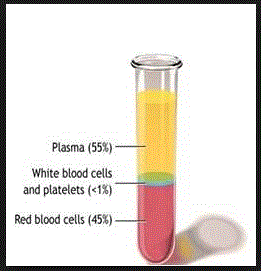 1. The average adult has five litres of blood pumping
around their body. About 20 per cent of this blood is in the heart and
arteries, whooshing out through the aorta at 45 centimetres per second for a
person at rest. It reaches lows of just 0.5 millimetres per second as it
branches out into the maze of tiny capillaries which deliver oxygen to cells,
tissues and organs.
1. The average adult has five litres of blood pumping
around their body. About 20 per cent of this blood is in the heart and
arteries, whooshing out through the aorta at 45 centimetres per second for a
person at rest. It reaches lows of just 0.5 millimetres per second as it
branches out into the maze of tiny capillaries which deliver oxygen to cells,
tissues and organs.
2. The blood picks up speed again to around 25
centimetres per second as it returns to the heart in larger veins. The average
speed of blood in the body is 28 centimetres per second, which equals about
17,000 kilometres in a week. The reality is far more complicated as blood
pressure and heart rate (linked to how active you are, among other factors)
affect blood velocity dramatically.
 3. Blood is red because it contains iron, bound up in
a ring-like chemical structure called porphyrin within haemoglobin – the
protein responsible for carrying oxygen around the body. Haemoglobin is crammed
into our red blood cells, making them red too. Red blood cells are round with a
flattish, indented center, like doughnuts without a hole. They play an important
role in your health, remove carbon dioxide from your body, transporting it to
the lungs for you to exhale. Red blood cells are made inside your bones, in the
bone marrow (костный мозг). They typically live
for about 120 days, and then they die.
3. Blood is red because it contains iron, bound up in
a ring-like chemical structure called porphyrin within haemoglobin – the
protein responsible for carrying oxygen around the body. Haemoglobin is crammed
into our red blood cells, making them red too. Red blood cells are round with a
flattish, indented center, like doughnuts without a hole. They play an important
role in your health, remove carbon dioxide from your body, transporting it to
the lungs for you to exhale. Red blood cells are made inside your bones, in the
bone marrow (костный мозг). They typically live
for about 120 days, and then they die.
4. Oxygen-rich blood is a bright red, whereas
deoxygenated blood is a darker brownish red. The veins in your wrists (запястие) may appear blue but they are red too – the blue
colour is the result of the way light travels through your skin. While all vertebrates
(позвоночные) share the same colour blood, blue blood
does exist – eg horseshoe crabs have no haemoglobin, having opted (выбрав) instead for haemocyanin, a copper-based (содержащий медь) protein.
Do you know any other animals with blue coloured blood?






In the picture, the red blood cells look like rolls😂. I am hungry😂😂😂
ОтветитьУдалитьThank you for the information.
ОтветитьУдалитьBlue blood in scorpions, spiders, octopus, crayfish, etc.
ОтветитьУдалитьThank you for the information.Cool information
ОтветитьУдалитьBlue blood in octopus,cancer,spiders,scorpions.
ОтветитьУдалитьVery interesting information.
Very interesting information🌸
ОтветитьУдалитьVery interesting
ОтветитьУдалить